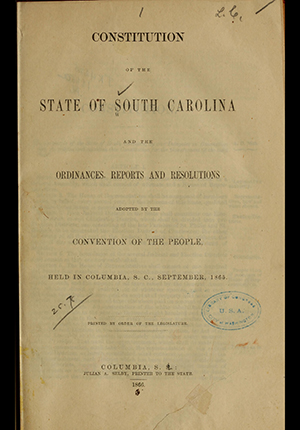
Constitution 101 Course
Start your constitutional learning journey

Mississippi and South Carolina | 1865

The Black Codes were a series of laws passed throughout the South in the wake of emancipation. Although often professing to respect the equality and civil rights of the newly emancipated, in reality most of the Black Codes were specifically designed to curtail the economic, political, and social freedom of African Americans and, through a combination of private and public efforts, restore much of the slave system that had existed prior to the war. Their passage inflamed Republicans in Congress and were cited as justification for passage of the Civil Rights Act of 1866 and the Fourteenth Amendment.

Director, Initiative on Politics and Statesmanship, James Madison Program in American Ideals and Institutions, Princeton University

Melvin G. Shimm Professor of Law at Duke University School of Law
Mississippi Black Codes (1865) – “An Act to Confer Civil Rights on Freedmen, and for other Purposes”:
Section 3. …it shall not be lawful for any freedman, free negro, or mulatto to intermarry with any white person; nor for any white person to intermarry with any freedman, free negro, or mulatto; and any person who shall so intermarry, shall be deemed guilty of felony, and on conviction thereof shall be confined in the State penitentiary for life….
Section 7. . . . every civil officer shall, and every person may, arrest and carry back to his or her legal employer any freedman, free negro, or mulatto who shall have quit the service of his or her employer before the expiration of his or her term of service without good cause….
Section 9. . . .if any person shall persuade or attempt to persuade, entice, or cause any freedman, free negro, or mulatto to desert from the legal employment of any person before the expiration of his or her term of service, or shall knowingly employ any such deserting freedman, free negro, or mulatto…shall be guilty of a misdemeanor….
“An Act to Amend the Vagrant Laws of the State”
Section 2. …all freedmen, free negroes and mulattoes in this State, over the age of eighteen years…with no lawful employment or business…shall be deemed vagrants….
“An Act to punish certain offenses therein named, and for other purposes”
Section 1. ..no freedman, free negro or mulatto, not in the military service of the United States Government, and not licensed so to do by the board of police of his or her county, shall keep or carry fire-arms of any kind, or any ammunition, dirk or bowie knife. …[I]t shall be the duty of every civil and military officer to arrest any freedman, free negro, or mulatto found with any such arms or ammunition, and cause him or her to be committed to trial in default of bail.
South Carolina Black Codes (1865) – “Some Misdemeanors”:
XIII. Persons of color constitute no part of the Militia of the State, and no one of them shall, without permission in writing from the District Judge, or a Magistrate, be allowed to keep a fire-arm, sword, or other military weapon….
XXII. No person of color shall migrate into and reside in this State, unless, within twenty days after his arrival within the same, he shall enter into a bond, with two freeholders as sureties….
“Contracts for Service”
XXXV. All persons of color who make contracts for service or labor, shall be known as servants, and those with whom they contract, shall be known as masters.
“Mechanics, Artisans and Shop-Keepers”
LXXII. No person of color shall pursue or practice the art, trade or business of an artisan, mechanic or shop-keeper, or any other trade, employment or business (besides that of husbandry, or that of a servant under a contract for service or labor) on his own account and for his own benefit, or in partnership with a white person…until he shall have obtained a license therefore from the Judge of the District Court; which license shall be good for one year only.
“Vagrancy and Idleness”
XCVI. All persons who have not some fixed and known place of abode, and some lawful and respectable employment…shall be deemed vagrants, and be liable to the punishment hereinafter prescribed.
XCVIII. The defendant, if sentenced to hard labor, after conviction may be hired for such wages as can be obtained for his services, to any owner or lessee of a farm, for the term of labor to which he was sentenced.
Sources: Laws of the State of Mississippi (Jackson, Miss: J.J. Shannon & Sons, 1866), 82-86, 91, 165; Acts of the General Assembly of the State of South Carolina (Columbia, SC: Julian A. Selby, 1866), 14-15, 34-44